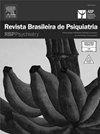The association between schizophrenia and increased COVID-19 mortality in a cohort of over 2 million people in Brazil.
IF 3.6
3区 医学
Q1 PSYCHIATRY
引用次数: 0
Abstract
OBJECTIVE To describe the clinical outcomes and risk factors of death related to mental disorders in a cohort of Brazilian hospitalized patients with COVID-19. METHODS This retrospective cohort study utilized the Brazilian database SIVEP-Gripe to analyze patients aged ≥18 years who had been hospitalized with COVID-19 between 2020 and 2022. The exposure of interest were mental disorders (anxiety, depression, schizophrenia, and bipolar disorder), identified through self-reported fields. The primary outcome was in-hospital mortality. Covariates included demographic and clinical features. Descriptive statistics, t-tests, chi-square tests, and binary logistic regression were used to analyze the data. RESULTS A cohort of 2,124,285 patients was included in the analysis, with 23,246 individuals (1.1%) having self-reported mental disorders. Among these mental disorders, depression was the most prevalent (52.3%). The mortality rate of the patients with mental disorders was 30.8%. Analysis of risk factors for mortality revealed that age, gender, region, dyspnea, low oxygen saturation, and comorbidities were associated with an increased risk of death. Patients with schizophrenia had a higher mortality risk (aOR:1.68;95%CI:1.54-1.81). CONCLUSIONS Patients diagnosed with schizophrenia have a greater likelihood of COVID-19- related death than those without mental health conditions. These findings underscore the significant effect of serious mental disorders on COVID-19 mortality.在巴西 200 多万人的队列中,精神分裂症与 COVID-19 死亡率增加之间的关系。
方法这项回顾性队列研究利用巴西数据库 SIVEP-Gripe,对 2020 年至 2022 年期间因 COVID-19 住院、年龄≥18 岁的患者进行分析。研究对象为精神障碍(焦虑症、抑郁症、精神分裂症和双相情感障碍),通过自我报告领域进行识别。主要结果是院内死亡率。协变量包括人口统计学特征和临床特征。结果分析对象包括 2,124,285 名患者,其中 23,246 人(1.1%)自述患有精神障碍。在这些精神障碍中,抑郁症的发病率最高(52.3%)。精神障碍患者的死亡率为 30.8%。对死亡风险因素的分析表明,年龄、性别、地区、呼吸困难、低血氧饱和度和合并症与死亡风险的增加有关。精神分裂症患者的死亡风险更高(aOR:1.68;95%CI:1.54-1.81)。这些发现强调了严重精神障碍对 COVID-19 死亡率的显著影响。
本文章由计算机程序翻译,如有差异,请以英文原文为准。
求助全文
约1分钟内获得全文
求助全文
来源期刊
CiteScore
6.60
自引率
0.00%
发文量
83
审稿时长
6-12 weeks
期刊介绍:
The Revista Brasileira de Psiquiatria (RBP) is the official organ of the Associação Brasileira de Psiquiatria (ABP - Brazilian Association of Psychiatry).
The Brazilian Journal of Psychiatry is a bimonthly publication that aims to publish original manuscripts in all areas of psychiatry, including public health, clinical epidemiology, basic science, and mental health problems. The journal is fully open access, and there are no article processing or publication fees. Articles must be written in English.

 求助内容:
求助内容: 应助结果提醒方式:
应助结果提醒方式:


